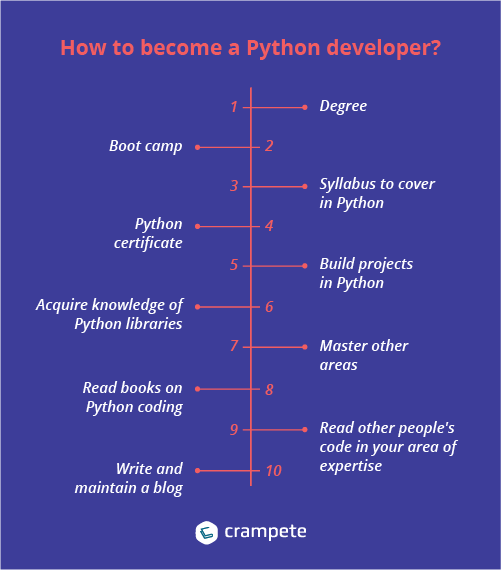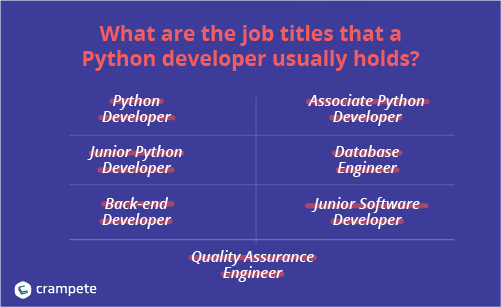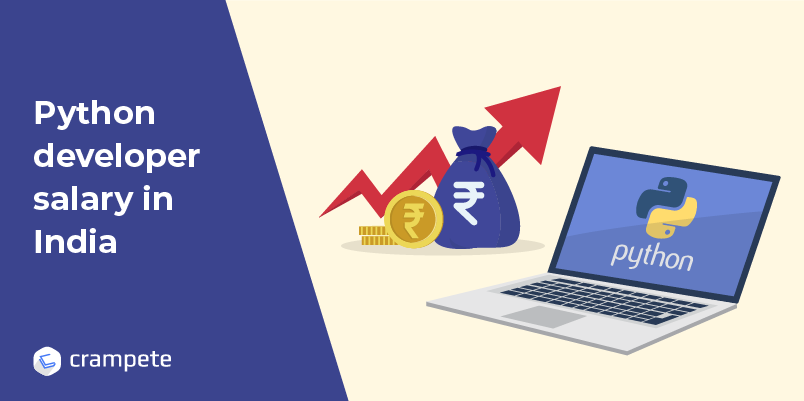
How to Become a Python Developer in 10 Easy Steps?
Python is such a popular programming language in today's technological world that it's natural for a novice to wonder how to get started as a python developer. So, in this blog, we'll show you how to become a python programmer or developer in India . You'll also learn about the various degrees of python developer training and if they're sufficient to land a job.
Who is a Python developer?
Python programming language is an object-oriented, interpreted, and high-level programming language. Python is a fairly basic language compared to other programming languages, with a simple syntax that lowers the programme maintenance costs. Python also has modules and packages, which makes it easier to reuse codes.
Students always desire to be python developers because of all of these benefits of the language. Python has consistently been among the top five most popular programming languages in recent years. So, who exactly is a python developer now? The server-side web application logic is written by a python web developer. Python developers develop the back-end side, connect the application with third-party web services, and assist front-end developers by integrating python applications.
Why become a Python developer?
Python was the most popular programming language in 2018, and the trend appears to be continuing every year. The ease of access and growing demand are compelling reasons to pursue a career as a Python coder. Job vacancies are many, and being the one with in-demand talents will help you stand out from the crowd.
Python programming language offers a number of characteristics that encourage programmers to use it instead of other languages. Python is much easier to learn because of its simple syntax and readability.
As it's so simple, developers won't have to spend much time creating sophisticated applications. They would just concentrate on the implementation portion, which Python excels at.
Python is chosen by many programmers because it is:
- Simple
- Versatile
- Integrated Language
- In-demand
Companies that rely on the application of Python
- Nasa
- Mozilla Firefox
- IBM
- Dropbox
- Netflix
How to become a Python developer ?
Follow the 10 easy steps given below to become a python developer.
Learning new technologies might be difficult if you don't know how to study, what to learn, or which ideas to focus on; therefore, following a roadmap is always a smart idea. If you're wondering how long it takes to learn Python, you've come to the right place.
So, let's start looking forward to becoming a python developer.

Step 1: Degree
For prospective Python software engineers, a computer science degree provides a well-rounded education. You may also pursue a bachelor's degree in software engineering or information science. You'll get a foundation in math and computer science in these degrees, which will help you build better knowledge of software design, programming, and testing.
However, obtaining a three or four-year degree in coding necessitates a significant investment of time and money.
On the other side, a coding degree demonstrates that you put in the effort to learn how to code. Some companies require a degree to be considered for a Python software developer employment, while others are satisfied with certificates and experiences alone.
Step 2: Boot camp
Hiring managers don't always look for a related degree. Rather, they request a portfolio of your Python programming abilities as well as coding exams. According to Indeed, 88% of companies feel that coding boot camp graduates are as much prepared as degree holders, if not more so.
A coding boot camp is a technical training programme that teaches students, who have little or no coding experience, the skills they'll need to acquire a job. The fundamentals of coding are taught to students, as well as how to apply these abilities to real-world situations.
The objective of a coding boot camp is to educate students how to construct apps at a professional level in order to assist them move into a coding career or software development.
Step 3: Syllabus to cover in Python
- Learn the fundamentals. Learn about the history, syntax, and installation of the programme, as well as some basic concepts including statements, variables, and operators.
- Learn more about Python's applications. Also, be aware of the distinctions between Python 2 and Python 3.
- Learn basic data structures such as lists, sets, and dictionaries.
- Important topics such as decision-making and loops should be understood.
- Discover how to set up a virtual environment.
- After that, you may go on to functions and recursion.
- Begin by learning about object-oriented concepts like classes, methods, inheritance, and overloading.
- Learn about modules and functions, projects , packages, and practise using popular modules like os, namedtuple, and calendar.
- Learn how to work with files. More advanced subjects such as generators and decorators, as well as shallow and deep copying will be covered.
- Learn how to create and utilise random numbers and regular expressions as well.
- More advanced subjects such as networking, XML processing, and multiprocessing will be covered.
- Learn how to use Python to create graphical user interfaces.
- Learn about exceptions and how to deal with them.
- Learn how to use Python packages such as SciPy, NumPy, and Pandas.
- Learn to debug, unit-test, log, serialize, and access the database.
Step 4: Python certificate
While a degree confers an academic title upon completion of several years of study, certification courses provide a document declaring that you have finished a particular amount of training for a specific job. As a result, obtaining a Python certification displays your commitment to the language and provides a significant boost to your CV.
Get certified in python by Crampete.
To get a certificate, you must first get experience in Python, which can take a few months or many years of coding, in your spare time or by attending a boot camp. Once you get this experience, you will be ready to take the exam.
Step 5: Build projects in Python
Joining a coding boot camp not only helps you prepare for job interviews, but also helps you develop a portfolio of the projects you worked on. Once you have experience in bootcamp, you'll be able to show your portfolio to potential employers.
Although a coding boot camp does not provide you with a degree, it does show that you have a solid educational basis of coding skills.
Step 6: Acquire knowledge of Python libraries
You should familiarise yourself with the Python library. You can finish your work more quickly and efficiently with the help of libraries. Pandas, NumPy, PyBrain, Seaborn, Scikit-Learn, and more such libraries are available. These libraries contain functions that you may utilise in your code, which cuts down on your coding time.
Read More: Learning path to become python full stack developer
Step 7: Master other areas (other than technical skills)
Apart from these technical abilities, work on your communication skills. Make an effort to improve your logical abilities. Develop a problem-solving mentality.
Consider how each problem will be implemented in practise. Make use of your thoughts to get insight into the inner workings of any circumstance.
You can go a long way after mastering all of the above principles and earning a reputation as the greatest Python coder. Always remember to put what you've learned into practise. Your future as a Python developer will be bright as a result of this.
Step 8: Read books on Python coding
Even if you're a seasoned Python programmer, there's always something new to discover. Python coding books can offer a lot of fresh information. The more you learn, the more confident you become.
Step 9: Read other people's code in your area of expertise
Many users on GitHub have distinct and well-organized coding styles. Learning from other Python developers is one of the finest methods to improve your coding style. Examine other codes that are comparable to your skill level to get a sense of the many styles available.
Fredrik Lundh, Kenneth Reitz, Armin Ronacher, Raymond Hettinger, Doug Hellmann, and Daniel Roy Greenfeld are some of the most well-known GitHub developers.
Step 10: Write and maintain a blog
A blog boosts your profile's credibility. You can discuss how you got started as a novice, your journey towards a python developer, the resources you used to get information, the projects you worked on, and so on. As a consequence of all these, employers may understand your coding style by looking at your profile.
Who is a good python developer?
- Possessing a problem-solving mentality
- Strong communication skills will be required to convey project requirements and features to your team. You'll be able to develop better documentation as a result of this.
- A desire to learn new techniques and libraries
- Internal knowledge of how things operate
- Excellent technical abilities
What are the job titles that a Python developer usually holds?
Python programmers should seek job titles that specifically include Python. Most Python Developer jobs will demand you to specialise in and have a thorough understanding of Python, as well as other technologies in their stack. This may be a high-level understanding or a promise that you'll learn more about their tech stack over your onboarding time.

These positions use Python on a daily basis:
- Python Developer
- Junior Python Developer
- Back End Developer
- Associate Python Developer
- Database Engineer
- Junior Software Developer
- Quality Assurance Engineer
Job roles
Here are the job roles for a Python developer -
Software Developer/Engineer
Core Python, web frameworks, and object relational mappers are all required skills for a software developer/engineer. To integrate apps with other components, they need to be familiar with multi-process architecture and RESTful APIs.
Skills in front-end programming and database expertise are two desirable qualities for a software developer. When you want to be a software developer, you'll also need to know how to write Python programmes and manage systems.
Python Web Developer
To create server-side web functionality, a Python web developer is needed. They should be knowledgeable with web frameworks, as well as HTML and CSS, which serve as the building blocks of web development.
Database expertise and the ability to write Python programmes are desirable skills. Tkinter is a must-have library for GUI-based web applications. Once you've mastered all of these abilities, you'll be a python web developer.
Data Analyst
Data interpretation and analysis require the services of a data analyst. They should have a strong understanding of mathematics and statistics.
Python libraries such as Numpy, Pandas, Matplotlib, seaborn, and others are used for data visualisation and manipulation, thus knowing Python might be beneficial in this area as well.
Data Scientist
In order to assist in the decision-making process, a data scientist must have a deep understanding of data analysis, interpretation, manipulation, mathematics, and statistics. They must also be experts in machine learning and AI, including all machine learning methods such as regression analysis and naive bayes, among others.
Click here: How to become a data scientist step by step
A data scientist must be well-versed in libraries such as Tensorflow, scikit-learn, and others. A data scientist will take on responsibilities that need all-around growth.
To learn about data science courses, join Crampete’s data science class.
Machine Learning Engineer
On top of mathematics and statistics, a machine learning engineer must grasp deep learning principles, neural network design, and machine learning algorithms. A machine learning engineer must be well-versed in algorithms such as gradient descent, regression analysis, and prediction model construction.
AI Engineer
Programming abilities, as well as understanding of Data Science and Data Modelling principles, are required for an AI engineer. Understanding deep learning and neural networks is also required.
An AI engineer's job is to design computers to think like a human mind, or to respond as a person would in a given situation. All of this occurs as a result of a cognitive simulation.
Automation Testing Engineer
For any automation test engineer, programming abilities are like a foundation stone. The Selenium web driver, as well as other associated technologies, is required. For example, the ATLC approach and TestNG.
As an automation engineer, you'll be responsible for identifying software operations that can be automated. They must create and execute automation scripts to verify the processes' functioning, as well as establish testing techniques and frameworks for automation.
Responsibilities
- Write error-free, reusable, scalable code.
- To construct a responsive and effective application, work on the server-side portion of the development.
- Integrate pieces for the application's front-end development.
- Provide solutions for data security and protection.
- To give analytical and innovative solutions, communicate with other teams.
- Debug and test the code you've developed.
How much python knowledge is required to get a job?
After a certain degree of understanding of technology, the issue of how much python is good for getting a job inevitably comes. The answer to the preceding question is contingent on how much you've worked with it so far.
For example, getting a fresher job as a python developer is sufficient if you have a solid grasp of the language and have built numerous projects to strengthen your abilities. However, if you have only studied the concepts and have no idea how to apply them, it is suggested that you learn more and master your core.
However, if you are just starting out as a python programmer, it is always a good idea to learn the intermediate topics and use them to build your projects to show to the recruiter, as well as to learn and understand some of the advanced topics and frameworks used to develop using the python language.
Django and Flask are two frameworks that are highly necessary to master if you want to become a python developer in 2023, and you should know how to use and apply them once you've completed the intermediate subjects.
How to prepare for a python software developer interview?
Preparing for a Python software developer interview
Given the scarcity of Python software engineers, you may believe that getting a job is as simple as turning up and answering a few basic Python questions. It's quite improbable that this is the case. If you want to get into the Python programming world, here's what you need to do:
Demonstrate that you can code effectively: To describe your experience, create a portfolio and include everything you've done in a public forum. For building profiles to display their sample work, most developers choose GitHub.
Learn how to use Python's most common algorithms and data structures: Dictionaries, lists, tuples, and how to build classes are among the topics covered. You should also be able to compare and contrast common Python data structures, as well as explain how you may leverage an existing data structure to create stack functionality. The stack is a list of all the technical services that go into creating and running a single app.
It takes more than memory to be an effective Python coder: It entails much more than simply memorising the language's syntax or frequently used algorithms and data structures. Your ability to grasp and solve issues using well-developed soft and hard talents will help you stand out. Put in a lot of practise time and expose yourself to a variety of problem-solving situations.
Get to know Python interview questions and answers.
Python developer salary in India
Python has grown in popularity among developers with each passing year since its introduction. Python may not be number one right now, but it will undoubtedly be the programming language of the future in three to four years.
Python's future appears to be bright and full of possibilities. This rise has resulted in a considerable increase in the pay of Python developers in India.
The average salary of a python developer in India is ₹572,234/yr. This range could go from ₹1 million per annum to ₹240k per annum.

Many factors influence a Python developer's salary, including their location, talents, employment position, employer, and experience. Let's take a closer look at the elements that influence a Python Developer’s pay.
- Basic Salary : 231k - 1M
- Bonus: 10K - 265K
- Profit Sharing - 4K - 437K
- Commission - 0 - 240k
- Total Pay : 239k - 1M
Many factors, including location, skills, work position, company, and experience, will influence a Python developer's salary. Let's take a closer look at the variables that influence the pay of a Python Developer.
Python developer salary based on experience
Because this language is so young, the experience plays a big role in determining the average wage for a python developer in India. As a result, the more experience you have on your CV as a python developer, the higher the compensation you may expect from a company.
The experience shows how well you grasp the language, how comfortable you are with it, and how well you use it to its full potential.
In India, a fresher python developer earns an average of 481,784 per year, while a python developer with 1- 4 years of experience earns an average of 545,231 per year.
A python developer in his or her mid-career with 5-9 years of experience earns an average of 960,427 a year.
A python developer with more than 10 years of experience earns an average of Rs.1,348,147 per year.
Python developer salary based on location
- Bangalore – The average salary of a python developer in Bangalore is ₹726,700/year
- Pune, Maharashtra – The average salary of a python developer in Pune is ₹510,725/year
- Mumbai, Maharashtra – The average salary of a python developer in Mumbai is ₹504,397/year
- Chennai, Tamil Nadu – The average salary of a python developer in Chennai is ₹501,492/year
- Gurgaon, Haryana – The average salary of a python developer in Gurgaon is ₹641,000/year
- New Delhi – The average salary of a python developer in New Delhi is ₹605,785/year
- Jaipur, Rajasthan – The average salary of a python developer in Jaipur is ₹410,000/year
Python developer salary in other countries
Country Average Salary
Germany $58,932
Belgium $45,065
Switzerland $192,639
The Netherlands $49,520
UK $55,190
Python developer salary based on companies
As we've seen, certain companies require the use of the Python programming language to produce their finest work. This emphasises the importance of the employer/company in determining a python developer's pay scale.
See the chart below to learn about the best Python developer hiring firms and the average salary they provide.
| Companies | Average Pay/per annum (INR) |
| Wipro Technologies | ₹ 4,00,000 |
| Infosys | ₹ 4,25,732 |
| Tata Consultancy Services | ₹ 4,20,837 |
| Tech Mahindra | ₹ 5,28,000 |
| Capgemini | ₹ 5,23,924 |
| Cognizant Technology Solutions | ₹ 5,45,014 |
| Accenture | ₹ 5,64,100 |
| Amazon Inc | ₹1,221,000 |
Python developer salary based on skills
The demand for python is undeniable. However, a python developer's compensation is never completely determined by his or her command of the language. It is also dependent on a developer's skill set. The competition in the field is fierce, as the language's popularity grows, so does the community.
As a result, if you want a better compensation structure, you'll need a strong collection of talents on your CV.
The table below explains some of the skills you need and the typical salary associated with them
| Skills | Average Pay/per annum (INR) |
| SQL | ₹489,030 |
| SVN (Apache Subversion) | ₹848,000 |
| Git | ₹872,500 |
| API Development | ₹1,000,000 |
| Test Automation | ₹1,098,268 |
Advice to all Python developers
If you have a question on how to become a python developer, follow the tips given below.
A well-written CV tailored to this technical profession, a completely filled out and active LinkedIn page, and a good GitHub portfolio are all required to bag a job offer as a Python Developer. Contributing to open-source projects on GitHub or posting your own passion projects and making continuous contributions to them while your job hunt may offer you an advantage.
Many recruiters search for Developers that produce case studies on their work and post them on a blog. This demonstrates the employers how you think, which is an important factor in their hiring choice. For a technical role like this, practising mock interviews, coding problems, and whiteboarding at home is very necessary.
The developer job search is frequently the consequence of a building of momentum. Making git contributions on a weekly basis, interacting with new people on LinkedIn, applying for jobs, and writing on your blog should all be the top priorities for a job-seeking Python Developer.
Python is a programming language that has the potential to break the number of programming languages dominance rule. As a result, the prospects for a python developer appear to be bright and growing. The learning curve is more favourable. So, when it comes to being a Python developer, don't overthink. If you think you have the potential, just give it a try.
FAQs
1. How long does it take to become a Python developer?
It will take 8-10 weeks to become a python developer if you are learning the language from scratch. Basic and elementary Python concepts such as variables, data types, conditional statements, functions, classes, and exception handling may take six to eight weeks to understand.
2. What do you need to become a Python developer?
Python web frameworks and event-driven programming are required.
- Basic knowledge of front-end technologies is required.
- Exceptional attention to detail.
- Excellent problem-solving and communication abilities.
- Understanding of code versioning tools at a high level.
3. Is it easy to become Python developer?
The Python programming language offers a number of characteristics that encourage programmers to use it instead of other languages. Python is much easier to learn because of its simple syntax and readability. Because it's so simple, programmers won't have to spend as much work into creating sophisticated applications.
4. How do I become a Python developer in 2023?
- Python is a programming language that can be learned to read and write.
- Develop your Python abilities by working on projects.
- Create a portfolio of Python projects that you've accomplished.
5. Is Python enough to get a job?
While knowing Python may be enough to secure a job, the majority of occupations require a set of abilities. You may obtain a job writing Python code that links to a MySQL database, for example. Javascript, HTML, and CSS are required to create a web application. You should be familiar with mathematical modelling if you want to go into machine learning.
6. Is Python developer a good career?
Python development is a fantastic career choice, owing to the growing need for Python developers across a variety of sectors. You may anticipate to work as a Python developer on creating websites and programmes, as well as solving data algorithm issues and much more.
7. What qualifications do you need to be a Python developer?
The qualifications you need to be a python developer are understanding of Python event-driven programming and web frameworks.
- knowledge of front-end technologies at a basic level.
- high level of detail.
- Excellent problem-solving and communication abilities.
- a thorough knowledge of code versioning tools.
8. python developer salary
According to PayScale, the starting compensation for a Python Developer is Rs.420,233. It amounts to around Rs.30,607 a month. The pay might be as much as Rs. 1,000,000 each year. On the other hand, the salary will be around Rs. 215,076 depending on the position and factors like experience and location.

Accelerate Your Career with Crampete




